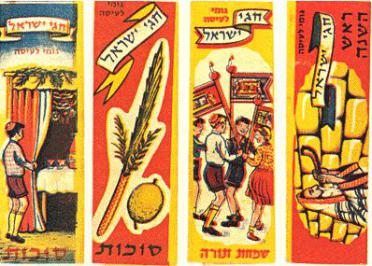Every week, parshaoftheweek.com brings you a rich selection of material on parshat hashavua, the weekly portion traditionally read in synagogues all over the world. Using both classic and contemporary material, we take a look at these portions in a fresh way, relating them to both ancient Jewish concerns as well as cutting-edge modern issues and topics. We also bring you material on the Jewish holidays, as well as insights into life cycle rituals and events...
Last week, we marked five years to my father's passing. Every year at this time, a week or so before Passover, the family visits his grave, and we say kaddish, some prayers, and a few words. This year, thinking about my father, I was struck by how central the father/son relationship is to the Passover Seder: The entire text of the Hagadah actually hinges on and revolves around the dynamic of parents trying to get children to ask questions which the parents then answer - Why is this night different? Why are we eating this strange food? Well, children, originally we were slaves in Egypt, God freed us, etc.
It occurred to me that this interaction may well be central to the parent/child relationship all year round, and not only on the Seder night. Perhaps parents are meant to encourage and empower their children to be curious, to ask, to challenge, and, at the same time, to have the answers ready for them when they do. When you look at it, this seems to be a somewhat contradictory dynamic. Raising children who notice, who question, would seem to call for one kind of parenting, while being a father or mother who has all the right answers for every question feels like a very different parent/child relationship. I can easily imagine being one or the other kind of parent - a father who encourages a questioning, probing attitude to things, OR one who has all the answers - but how can one be both of these things at the same time?
I guess this is the tightrope that parents need to walk with their kids: to try to encourage an open, inquisitive intelligence on the one hand, while, at the same time, communicating the conviction that there are answers, that we don't ask questions just to be clever, we don't challenge for the sake of challenging, or argue for the adrenalin rush we get from arguing. Rather, we really want to know the truth, to get to the reasons behind things, and we believe that, for many things at least, there are answers, there is a truth, a truth we can get to, if we will just start asking.
My father was a wise guy, a bit of a cynic, and no respecter of persons. He definitely was a model for challenging and doubting. He was also a very traditional father, a guy who knew things - he was a carpenter and a biologist - and who expected his kids to respect his greater knowledge and experience, and very much wanted us to depend on what he knew. The Passover Hagadah asks us to give to our children a tricky legacy. We are meant to raise children who are not afraid to ask, to challenge, but who also respect the fact, depend on the fact, that there are people - parents, first and foremost - who have some of the answers, who can, at least, start explaining things to us. This duality, the need to ask, along with the willingness to hear and accept an answer, is what it means to be Jewish, I think. I wish all of you a happy and meaningful Passover - may you be children who ask the questions, and hear the answers, and may you be parents who know what answers to give to your wonderfully inquisitive children.
Rabbi Shimon Felix



Get inspired by Pesach Divrei Torah from previous years